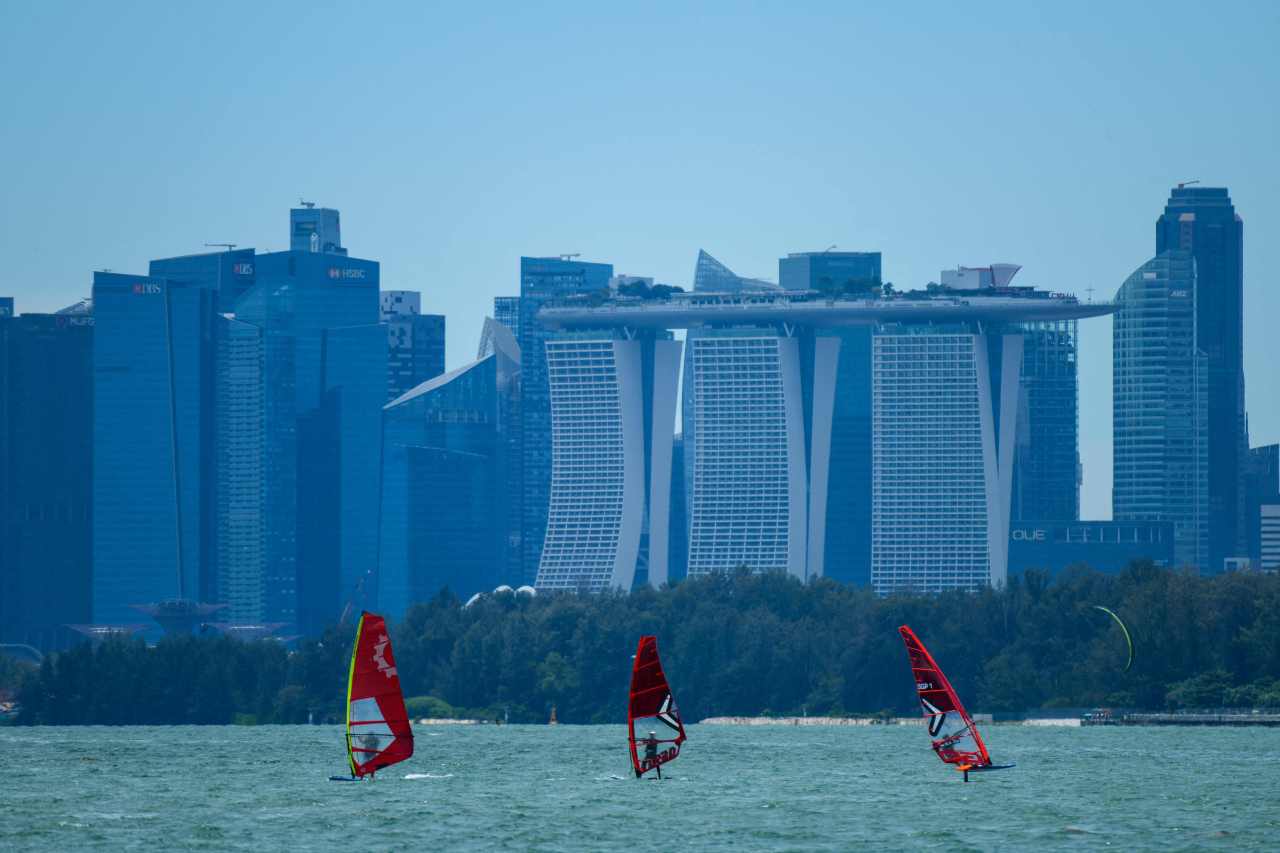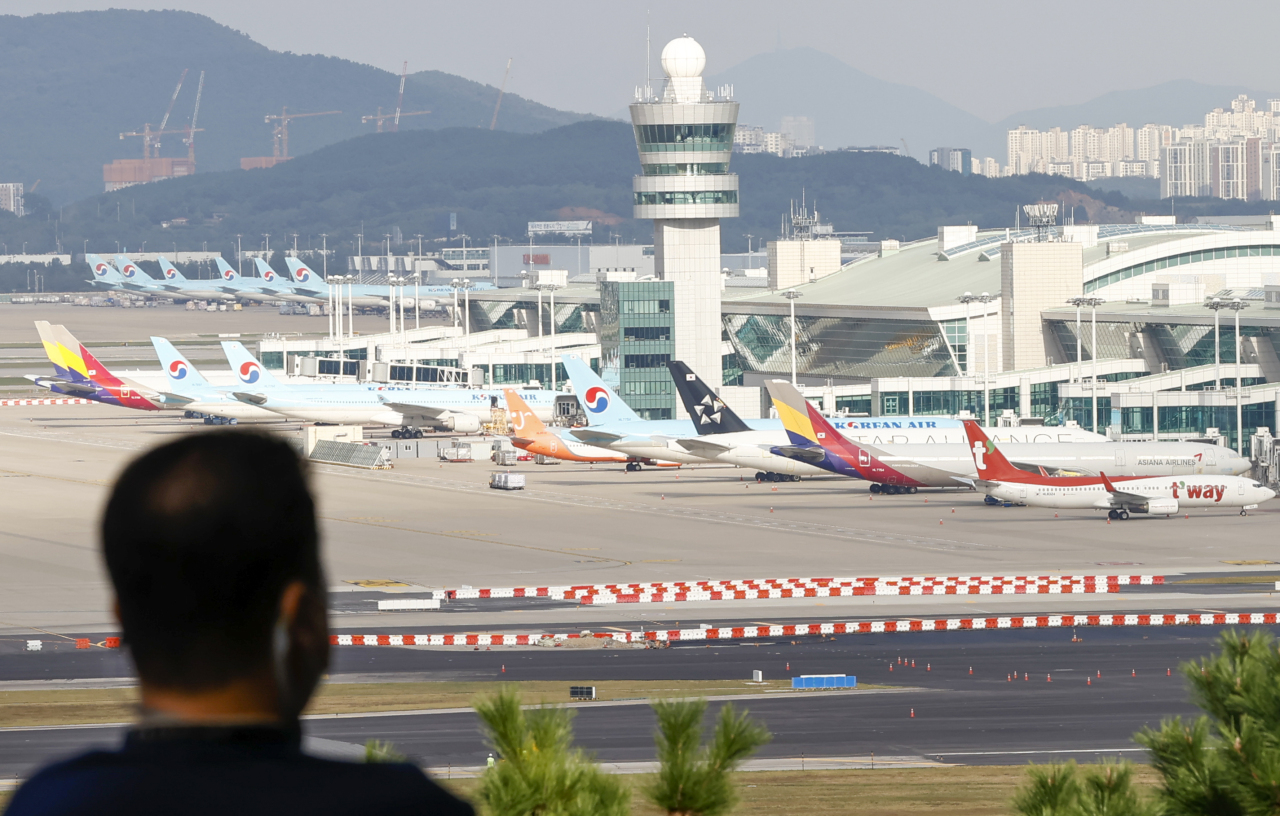 |
People sail along the East Coast waterway, as the city skyline is seen in the background in Singapore on Oct. 11. (AFP-Yonhap) |
South Korea inked a travel bubble agreement with Singapore on Oct. 8, the country’s second following a similar deal with Saipan. The deal is to allow those who are vaccinated to travel freely without the need for quarantine starting on Nov. 15. Their COVID-19 vaccination certificates will also be mutually recognized.
While travelers from both sides have expectations for going on sightseeing tours like they had before the pandemic hit in early 2020, Noh Hyung Rae, 36, a lawyer at a private corporation in northern Seoul, was looking for his work to get back to a normal routine as well.
“The past two years of pandemic have been extremely hard for me and my colleagues coping with videoconferencing with foreign clients,” Noh told The Korea Herald on Monday. Noting that Singapore has always been a preferred seat for high-profile international arbitrations, Noh welcomed the government’s signing of the travel bubble deal.
“We are looking forward to more face-to-face meetings with business clients from Singapore and relevant industries that have seen vibrant growth during the past decade,” Noh said.
Choi Won-joon, 37, a current affairs and documentary show producer for one of the major broadcasters in Korea, is also looking forward to stretching the realm of documentary content in working with neighboring Asian countries, especially Singapore, which has been at the top of his list.
“When producers search for vast amounts of Asia’s trend-related data and content from multiple angles, we turn our eyes to Singapore,” Choi said during a phone call with The Korea Herald on Monday. expressing excitement on the news of free travel being opened between the two countries.
The pandemic era has led broadcasters to come up with new ways to outsource content that needs to be filmed abroad, including in Singapore, to local practitioners residing in the region. But most producers in the field much prefer to be there in person to work on their stories, according to Choi.
With the rising popularity of Korean content, Choi added that “flying producers” -- those who go to a foreign country to train the production crew for a localized version of the original show -- will also see their field revitalized due to the travel bubble deal.
 |
A view of Incheon Airport from the airport’s observatory (Yonhap) |
Meanwhile, both the government and travel industry expect a resurgence in inbound travel, mainly as travelers from Singapore seek to visit Korea.
“Singapore ranks 12th in the number of annual travelers to Korea, recording some 200,000 people each year,” an official from the Culture Ministry’s International Tourism Division said. Southeast Asian countries used to have high demand for travel to Korea especially during the winter season and Korea could see a big wave of Singaporean tourists at the end of the year, the official added.
Despite the uptick in demand, the Korea Association of Travel Agents said that some crucial hurdles remain concerning guidelines for inbound travelers.
“Local travel agencies in Singapore continue to ask us for accurate guidelines regarding ‘safe travel.’ When we made inquiries to the relevant authorities, we found out that guidelines on many matters, such as accommodations and PCR test procedures, are still ambiguous,” Seo Dae-hun, directing manager of the KATA, told The Korea Herald.
Seo urged swift action in developing and distributing travel-related manuals, since the upcoming weeks will likely leave a lasting impression on inbound travelers as they start arriving in mid-November.
By Kim Hae-yeon (
hykim@heraldcorp.com)




![[AtoZ of Korean mind] Ever noticed some Koreans talk to themselves?](http://res.heraldm.com/phpwas/restmb_idxmake.php?idx=644&simg=/content/image/2024/11/03/20241103050186_0.jpg)
![[Breaking] North Korea fires short-range ballistic missiles: JCS](http://res.heraldm.com/phpwas/restmb_idxmake.php?idx=644&simg=/content/image/2024/11/05/20241105050038_0.jpg)



